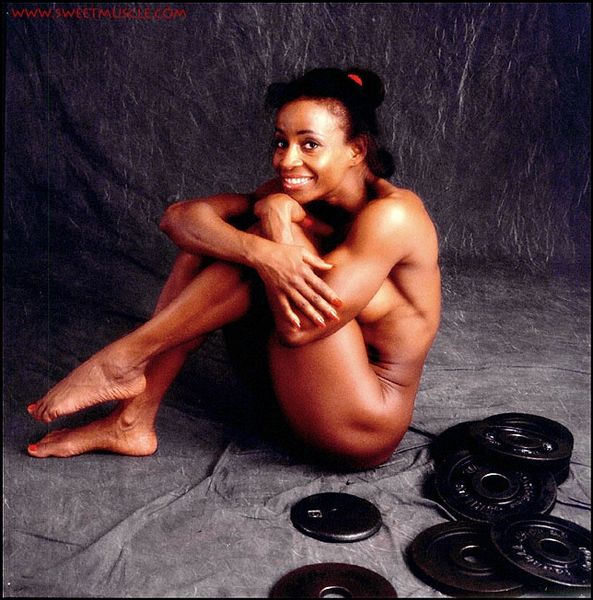Cannes, France – This year’s winner of the Sun-Times’ Sex Symbol of the Year competition at the Cannes Film Festival is Miss Carla Dunlap, who gets bitchy when she doesn’t pump iron. She was the winner of the 1983 U.S. Female Body Building Championships, majored in advertising design in college, and was once Rupert Murdoch’s paper carrier.
Dunlap joins a long tradition of Cannes sex symbols, who are chosen in an informal annual search conducted by this reporter. She also redefines the image of a sex symbol at the sex-mad festival. When photographers start pushing her, she pushes back.
In past years, the annual Sun-Times Cannes Sex Symbols have been more in the tradition of Edy Williams, first winner of the title, who once was asked to leave the Cartagena Film Festival in Columbia after she posed nude on a bronze equestrian statue behind a figure she belatedly discovered was Simon Bolivar, the father of his country.
Other winners have included Sybil Danning, who complained that Lou Ferrigno made her wear a cloak in all their scenes together in “Hercules”; Laurene Landon, who starred in “Hundra” as the leader of a tribe of prehistoric women who kidnapped men only for reproductive purposes, and Barbara Carrera, who smoked long black cigarettes and declined to reveal the country where she was born, inspiring Ebert’s Law: Never trust a woman who smokes long, black cigarettes and refuses to tell you what country she was born in.
Carla Dunlap, who was the most muscular woman in body building history when she started competing in 1979, was one of seven female body builders visiting Cannes to promote “Pumping II: The Women.” When the women posed on the beach in their bikinis, the photographers of Cannes, who thought they had seen everything, started climbing up each other’s backs for a better view.
Attracting such attention is not new to Dunlap. “When a woman walks in who has a radically different look,” she says, “it challenges you to decide what you think about it. Some people think I look beautiful. Some people are disgusted. I have to detach myself from their opinions; I feel good about my muscles and about myself.”
She is very muscular. She also is surprisingly articulate, although the moment you tell her that, she laughs: “You have no idea how often I hear that. Apparently people think if I have all these muscles, I must also have muscles between my ears. Looking the way I do, I’ve obviously given a great deal of thought to muscles on women, and I have a lot to say.”
What she says, she says in a beautifully modulated, musical voice; she is engaging, smart and funny. She is also philosophical about the while meaning of body-building, about the fact that until a decade ago, no woman in human history had looked like her.
In the movie, she is one of the finalists in the body building competition, and we watch while a panel of comically inept judges botch their criteria, their standards, and even their mathematics. Isn’t it frustrating, I asked, to spend uncounted agonizing hours pumping iron to be judged by a bunch of clowns?
“Well, we’re in the infancy of the sport of women’s body-building. Eventually, the judges will be former competitors, and the standards will be higher. But you have to remember that the onstage competitions are only one level of this sport. Essentially, I’m competing against myself. My own body is my opponent as I shape and define it.
“When we have body-building competitions, I think of them more as a performing art. I’ve always been in the arts in one way or another, as an artist, as an artist’s model, and as a member of the best synchronized swimming team in the country – that was in San Antonio, where Rupert Murdoch was on my morning paper route. I studied the media in college, as an advertising major. Now, my media is my body. I am making it into my expression.”
Dunlap said she’d never heard of women’s body-building when a photographer, shooting a story on synchronized swimming, told her about the “Best in the World Competition.” But she was naturally muscular: Without body-building training, she was the most developed woman in that year’s competition, and, in a way, she is responsible for a crucial turning point in the sport:
“I kicked of the high-heeled shoes. In those days, body-building was basically a man’s sport, and then they’d say Here come the girls! and we’d teeter out in high heels, sort of fluttering around the big, brave men. We were basically presented as T & A and muscles. Being black, I had a genetic head start in the T & A department, but I didn’t want to play the game. I kicked off the shoes. I wasn’t gonna break my face falling off the stage. Either this was a serious sport, or it wasn’t.”
Dunlap said she works out daily in a gym in Cannes.
“I’m on the far side of physical conditioning. Other people go through pain when they exercise. I go through withdrawal when I don’t. I get bitchy and offensive.”
French men like to tell the world how sophisticated they are about women. How do they respond to a woman who walks in with a low-cut cocktail dress that displays her broad shoulders and bulging biceps?
“Some are intrigued. Some are threatened. I’m more of a freak to them than I would be in America, where women’s body-building has had greater exposure. I can’t take my body off; I always look startling to someone who isn’t used to women with muscles. Some take it as a sort of challenge.
“In the early days of women’s body-building, there were men groupies who would hang around, and some of them would confide in me that they were probably latent homosexuals. They were attracted to big muscles in men, but they didn’t want to deal with that, so when women came along with muscles, that was a real turn-on for them.
“Today, now that the sport is six or seven years old, and having at least some musculature, some body definition, is fashionable – at least in California – we attract all kinds of men.
“Probably because of how I look, I feel very strongly against judging people only on their appearance. We go through life being categorized as young or old, black or white, handsome or ugly, and it’s what’s inside that makes someone worth spending time with. I personally do not judge people on the basis of their muscles or any other superficial aspect. My own muscles, I see as an expression of who I really am, inside. I like it when my boyfriend tells me he likes me for who I am, not what I am.”
Is your boyfriend a body-builder?
“He owns a gym in Massachusetts,” she said, and then she grinned. “And you’re gonna love this: He’s the son of the original Superman.”












